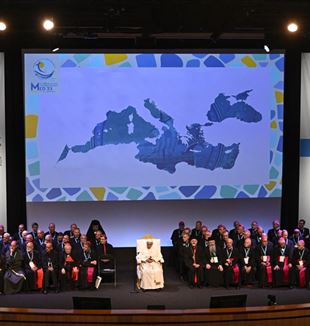
Pope Francis: "So the Mediterranean can return to being a laboratory of peace"
The Holy Father's words at the closing session of the 'Rencontres Méditerranéennes' (Marseille, 23 September 2023).Mr President, Dear brother Bishops, Distinguished Mayors and Authorities representing cities and territories bordered by the Mediterranean Sea, Dear friends all!
I offer my cordial greetings and I am grateful to each of you for having accepted the invitation of Cardinal Aveline to participate in these meetings. Thank you for your work and the valuable reflections that you shared. After Bari and Florence, the journey in service to the Mediterranean peoples is moving forward: here also, Church and civil leaders are gathered not to deal with mutual interests, but animated by the desire to care for men and women. Thank you for involving young people, who are the present and future of the Church and society.
Marseille is a very ancient city. Founded by Greek sailors who came from Asia Minor, legend traces it back to a love story between an emigrant sailor and a native princess. From its beginnings, it has displayed a diverse and cosmopolitan character: it welcomes the riches of the sea and gives a homeland to those who no longer have one. Marseilles tells us that, despite difficulties, coexistence is possible and is a source of joy. On the map, it almost seems to draw a smile between Nice and Montpellier. I like to think of it that way: Marseilles as “the smile of the Mediterranean”. So I want to offer you some thoughts centred around three aspects that characterize Marseille, three symbols: the sea, the port and the lighthouse.
1. The sea. A tide of peoples has made this city a mosaic of hope, with its great multiethnic and multicultural tradition, represented by the more than sixty Consulates in its territory. Marseille is both a diverse and distinct city, for it is its diversity, the fruit of an encounter with the world, that makes its history distinct. Nowadays we often hear that Mediterranean history is an intertwining of conflicts between different civilizations, religions and visions. Let us not ignore the problems that exist, yet let us not be misled: the exchanges that have taken place between peoples have made the Mediterranean the cradle of civilization, a sea overflowing with treasures, to the point that, as a great French historian wrote, it is “not one landscape, but countless landscapes. Not one sea, but a succession of seas,… for millennia everything has flowed into it, complicating and enriching its history” (F. BRAUDEL, La Méditerranée, Paris 1985, 16). Our sea (mare nostrum) is a place of encounter: among the Abrahamic religions; among Greek, Latin and Arabic thought; among science, philosophy and law; and among many other realities. It has conveyed to the world the lofty value of the human being, endowed with freedom, open to the truth and in need of salvation, who sees the world as a wonder to be discovered and as a garden to be inhabited, under the imprint of a God who makes covenants with men and women [...]
Continue reading on vatican.va